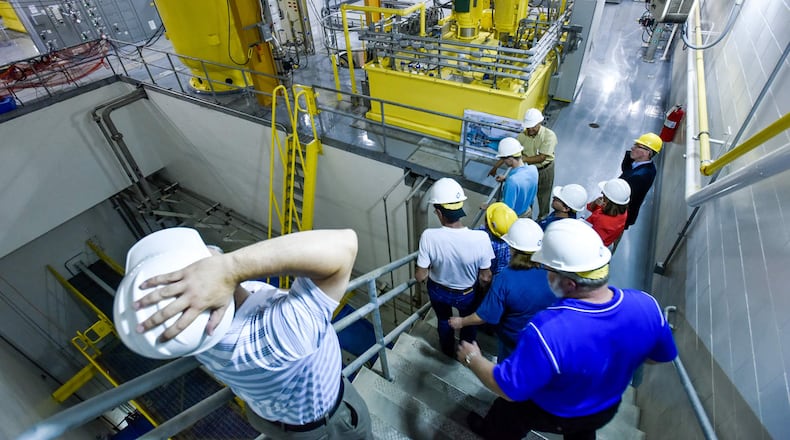The city, which owns its own electric, natural gas, water, sewer and storm-water utilities, plans to spend $5.92 million in utility funds to make needed utility upgrades to connect with the Champion site. That money eventually will be recouped over time through utility rates.
Hamilton plans to issue a 2 percent internal note for 12 months, basically borrowing from its own funds, before possibly using a bond-anticipation note or more permanent financing for that money in late 2019.
“The 2 percent internal note, we have a ton of funds that just sit in the bank (many of them from the sale of the hydroelectric plant on the Ohio River), and right now, they’re getting between 1.5-, 2-percent interest at the high end,” said City Manager Joshua Smith. “So we said we’ll borrow those from ourselves, but we’ll pay (back) the high end of the interest rate.”
The city is exploring how it will repay the amount it will be borrowing on the short-term basis, Smith said.
“We are exploring several different options in terms of how we permanently finance this,” Smith said. “Is it a long-term general obligation note? Do we sell off an asset to help pay for it? That’s what we’re trying to go through right now.”
“We’ve given council a menu in executive session of different things that they can consider, and we’re just doing our due diligence now,” he said. That’s why the internal note is for 12 months, he said.
“We’ve bought ourselves 12 months so we don’t rush into it, and we can figure out the best path forward,” Smith said.
“Do we convert that into a long-term general-obligation note? We could do that,” he said. “I would prefer to maybe sell something off and just pay cash so we’re not tied to it long-term, but we just don’t know what that is yet.”
That $1.5 million change comes because of the way Butler County officials would prefer to help the project, if they do, said Andy Brossart, the city’s financial adviser with Bradley Payne Advisors.
Aside from the utility work and Hamilton’s $8 million grant to the project, much of the money loaned will be repaid through time with Spooky Nook revenues from its operations.
Credit: Nick Graham
Credit: Nick Graham
Butler County and the Butler County Visitors Bureau have not yet decided whether they will provide funding to the project. After Wednesday’s city council decision, officials will kick off discussions with those entities, Brossart said.
He said if each provides $2.5 million, that money will go into roadway work connected with the Spooky Nook work, but that is subject to change.
The Thursday groundbreaking is set to happen at North B and Black streets — a gateway to the former Champion Paper mill. The event will be open to the public, and there will be free food and drinks provided in the event, with Richards Pizza and MillerCoors products served.
Spooky Nook now operates the largest indoor sports complex in North America near Lancaster, Pa. Its owner and founder, Sam Beiler, describes it as 14 acres of sports facilities under one roof — including indoor turf fields, many basketball and volleyball courts that draw athletic teams and their families from a several-hour drive. It also has outdoor facilities.
The Pennsylvania complex is so popular that visitors during 2017 booked nearly 61,000 room nights during visits. More than 1.1 million visited the site last year, according to an economic analysis performed by Tourism Economics, an Oxford Economics Company. That analysis found the Pennsylvania complex had $15.5 million in revenues last year, with another $5 million at its Warehouse Hotel, located inside the sports complex. The company last year had about 150 full-time employees and as many as 450 part-time seasonal workers.
About the Author


